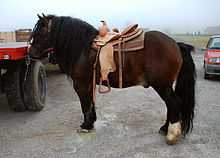Posavac horse
 Posavac horse | |
| Distinguishing features | Medium-sized draught horse; average height at the withers 140–150 cm |
|---|---|
| Alternative names | Croatian Posavac |
| Country of origin | Croatia |
| Breed standards | |
| Croatian Posavina Horse Society | Breed standards |
| Equus ferus caballus | |
The Posavac horse, also known as the Posavian, Croatian Posavina horse or Croatian Posavian (Croatian: Hrvatski posavac) is a cold-blooded breed of medium-sized draught horse with a high capacity for weight pulling. Throughout its history, the breed has been popular for pulling wagons. It is also used for forestry, agricultural and other work.
Characteristics
The Posavina horse ranges from 140 to 150 centimetres (13.3 to 14.3 hands) in height and weighs 500–600 kilograms (1,100–1,300 lb).[1] It is smaller than two other Croatian cold-blooded horse breeds, the Međimurje horse (155–165 cm) and Croatian Coldblood (150–160 cm). The Posavina horse may be bay or seal brown, less often black or chestnut; other colours are much more rare.
The head of a Posavian is relatively small, the neck short and muscular, the shoulder deep and broad, the chest wide and deep, and the legs are short and strong, with broad hooves. The breed is known for its easy-going temperament; it is mild and patient, obedient and willing to work hard.
History
The breed was developed in Posavina, a region alongside the Sava river in Croatia. It was based on a local Slavonian-Posavian horse breed called bušak (bushak), whose mares were crossbred to quality stallions of other breeds including Arabian, Nonius, Noriker and Percheron.
The majority of Posavina horses are in Croatia, but the breed is also present in Bosnia- Herzegovina and Slovenia.[2]
Status
The registered population of Posavina horses in Croatia was estimated at 5131 individuals in 2013., so the breed is considered endangered (FAO classification No. II). The total population in Croatia was reported to DAD-IS as 4500–5500 in 2012.[1] In Slovenia the number was reported as 1260 in 2011.[3]
See also
References
- ↑ 1.0 1.1 Breed data sheet: Posavac/Croatia. Domestic Animal Diversity Information System of the Food and Agriculture Organization of the United Nations. Accessed October 2013.
- ↑ Ante Ivanković, Jelena Ramljak, Peter Dovč, Nikolina Kelava, Miljenko Konjačić (2009).Genetic structure of three Croatian horse breeds: implications for their conservation strategy. Italian Journal of Animal Science 8 (4): 677–689.
- ↑ Breed data sheet: posavski konj/Slovenia. Domestic Animal Diversity Information System of the Food and Agriculture Organization of the United Nations. Accessed October 2013.
External links
- Features of Croatian autochthonous cold-blooded horse breeds
- Exterior features of the Posavina horse from the area of the Odra and Lonja field
- Croatian Posavina horse – not only a working animal, but a horse for recreational purposes and therapeutic riding
- Posavina horse – one of the genuine Croatian breeds protected by State Institute for Nature Protection (in Croatian)
- Endangered horse breeds (FAO)
- Totally 5131 Posavac horses were registered in Croatia in 2013. (in Croatian)
| |||||||||||||||||||||||||||||||||||
| |||||||||||||||||||||||||||||||
.jpg)
